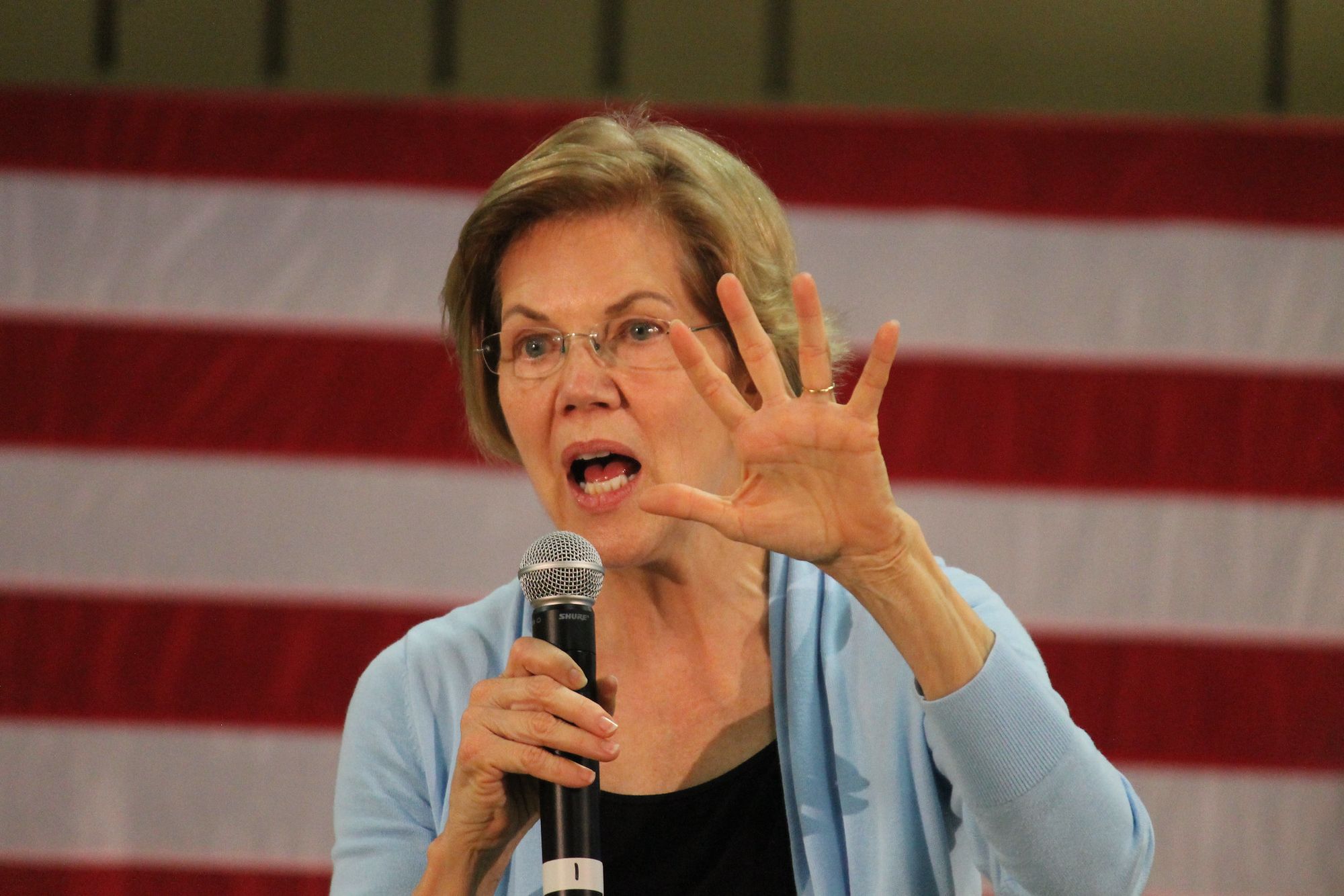Crypto Takes Center Stage in 2024 Election

America is about to pick its next president, and this time, crypto is part of the conversation!
It's shaping up to almost certainly be a race pitting Joe Biden versus Donald Trump (with long-shot contender Robert F. Kennedy, Jr. waiting in the wings).
All of these men have had something to say about crypto over the years, but what they're saying right now matters an awful lot, considering the regulatory inquisition that crypto has endured over the past 18 months at the cavalier hands of the SEC and the watchful eye of a DOJ that has followed an unspoken mandate to prosecute and publicize all actions against crypto users, regardless of size or scope.
The Democratic Party's loudest voices have turned crypto regulation into a political battleground. After years of branding themselves as the party poised to rein in Big Tech, a lack of progress there has pushed them to chase the budding crypto industry – a small, innovative corner of tech that has promised to challenge the centralized power of Big Tech.

In contrast, the Republican Party's efforts to generally favor lighter-handed regulation has put them in a favored position among crypto participants, incentivizing fresher lawmakers to build reputations as pro-crypto, pro-financial-freedom candidates, serving up bills that provide pathways and frameworks for the crypto industry to progress.
Why talk about all of this now?
We're at a key impasse this week. A bipartisan resolution which overturns a controversial SEC crypto accounting policy has just been voted through the Senate. But Joe Biden, who has been hesitant to insert himself into the crypto conversation has already signaled that he intends to veto the resolution, spotlighting himself as an adversary to the industry.
All of this has been happening while Trump explicitly courts a crypto industry he has had mixed things to say about over the years, but now is ready to fully mobilize. At a Mar-a-Lago meetup for holders of his NFT collection (scheduled in between court days of his hush money trial in NYC) the former President wooed the industry.
i asked donald trump how he’s going to keep crypto businesses in america.
— Malcolm (33.3%) (@macdegods) May 9, 2024
sounds bullish 🇺🇸 pic.twitter.com/rvuztPmQ8P
All of these happenings set up crypto regulation to increasingly be a battleground issue of this election that could draw more attention to the plights of the young industry and help either convert or entrench skeptical lawmakers eager to push the industry forward or tow their party line.
In this article, let's dig deeper into this pressure cooker of political process and turmoil and see where the major parties have stood and currently stand 👇

🔵 The Blues
The Democratic Party's broader stance can be summed up as generally hostile toward crypto, a stance reinforced by Biden's veto threat despite a number of Democratic Senators voting through the SEC rebuke resolution.
Here are the Democrats who crossed party lines to vote pro-crypto 👏
— Bankless (@BanklessHQ) May 16, 2024
Let's thank them. pic.twitter.com/xvUCZPCn4L
Top party members like Senator Elizabeth Warren (D-MA) and Senate Banking Chair Sherrod Brown (D-OH) have established reputations as critics concerned about consumer protection, financial crime, and environmental impact. Warren frequently warns of the risks posed by unregulated crypto markets and potential misuse for illicit activities. She’s emphasized:
- "Stablecoin legislation, which will grow the crypto market and provide opportunities for terrorist fundraising, must include the full suite of AML tools that the Treasury requested.”
- "Rogue nations, oligarchs, drug lords, and human traffickers are using digital assets to launder billions in stolen funds, evade sanctions, and finance terrorism."
On the other hand, younger Democrats have recognized crypto as a tool for financial inclusion and innovation. These politicians believe that crypto can drive positive change with proper regulatory frameworks.
- Rep. Ritchie Torres (D-NY) argues that crypto can provide financial access to those traditionally underserved by the banking system, co-sponsoring legislation to support this.
- Sen. Cory Booker (D-NJ) considers crypto a force for financial democratization and economic empowerment, citing its potential for positive change and the need to keep the U.S. strong in the industry.
- Rep. Darren Soto (D-FL) supports clear regulatory frameworks, believing blockchains can enhance financial transparency and efficiency.
These younger Democrats have sought to challenge the idea that their party is unilaterally anti-crypto, aiming to reframe the battleground as a generational one instead.
🗣️ Joe Biden
Nevertheless, President Biden moving himself to the main stage of the fight threatens to further cement this fight as one political party versus the other.
Initially, the Biden administration seemed to be adopting a balanced approach, aiming to foster innovation while ensuring consumer and financial stability through regulations. President Biden's executive order on cryptocurrency emphasizes the need for a coordinated federal policy to address the risks and benefits associated with digital assets.
However, President Biden's threat to veto a House resolution rejecting the SEC's crypto accounting guidance (SAB 121) looks more in line with the stance of party members like Warren and Brown. SAB 121 proposes that banks meet different criteria for custodying crypto than for custodying traditional assets, which hinders adoption. While a measure to overturn it passed in the Senate, after passing last week in the House, the White House issued a statement last week saying they would veto it.
Biden Administration says it will veto legislation to allow banks to actually custody crypto - it would “disrupt the SEC’s work to protect investors”
— RYAN SΞAN ADAMS - rsa.eth 🦄 (@RyanSAdams) May 8, 2024
This will cost them votes.
If they’re doing this before Nov I’m scared for what comes after Nov.
Seems they no longer care. pic.twitter.com/QJNTwWX9kL
This declaration reinforces the regulatory assault against the industry from the SEC, a predominantly Democratic body, to solidify the party’s majority stance as anti-crypto.
🔴 The Reds
The Republic Party has, generally, more consistently supported the crypto industry, with the lion's share of pro-crypto bills being brought to the floor by Republican lawmakers and Trump's Administration generally being a much quieter time for the industry from a regulatory standpoint.
Beyond the former President, other prominent Republicans like Senator Cynthia Lummis (R-WY) and Representative Tom Emmer (R-MN) have long advocated for clearer crypto regulation, introducing bills that create comprehensive frameworks for digital assets like stablecoins.
Republican lawmakers like Lummis and Emmer tend to be wary of "over-regulation," arguing it drives innovation overseas and undermines America's competitive edge – something that has clearly been happening in the crypto space.
Further, Republican lawmakers have tended to find more brand alignment than Democrats in the populism of Bitcoin as a check on Federal power.
We are so ₿ack. pic.twitter.com/ckHmXMHFL8
— Senator Cynthia Lummis (@SenLummis) May 16, 2024
For example, Senator Ted Cruz (R-TX) has highlighted Bitcoin's potential for investment and financial independence while noting the benefits of Bitcoin mining for Texas's energy grid resilience.
🗣️ Donald Trump
Trump is setting himself up as an industry savior, during a time when many crypto participants have grown frustrated with the regulatory approach of the Biden Administration.
Trump was his most explicit yet in his recent speech at Mar-a-Lago. These statements occurred at an event explicitly designed for his NFT holders, from whom he has already profited millions. That financial incentive is potentially coloring his explicit stance, but many in crypto are just happy to have a mainstream candidate voicing the issues that matter to them.
While Trump's comments at the event still lacked the specifics and the fervor some may have hoped for (he noted he was “fine with crypto” and emphasized the need for the U.S. to remain competitive in crypto globally and not be undercut by hostile regulation domestically), they served to drive a wedge between himself and President Biden, which was effective enough for many.
As expected, Crypto Twitter broadly responded well to his messages.
Obvious choice this November if you’re pro crypto 🇺🇸🎉
— Tommy (@Shaughnessy119) May 9, 2024
I hate politics but over the course of my life I’ll do everything to advance technology https://t.co/ZJIMnwjYOq
Where Does Conversation Move Next?
As the election approaches, crypto is becoming increasingly front-and-center.
The Democratic Party, led by figures like Senator Elizabeth Warren and Senate Banking Chair Sherrod Brown, continues to be the face of the regulatory war on crypto. This stance has also spread to include President Biden following the White House’s recent threat to veto the rejection of SAB 121 — a move aligning with the party's hawks and the predominantly blue SEC.
In contrast, Republicans have continued supporting the industry's domestic growth. Party members like Senator Cynthia Lummis, Representative Tom Emmer, and Senator Ted Cruz have publicly championed clear and comprehensive regulatory frameworks while warning against overregulation that could drive businesses overseas — a message further emphasized by Donald Trump during his recent NFT holders event.
Overall, the ideological divide on government intervention and financial innovation that underpins both parties sets the stage for crypto regulation to play a main stage role in the upcoming election!
Regardless of your personal stance, note the contrast between crypto’s role in the last election (nearly non-existent) and its role now. The evolution of its place in the political conversation from both sides clearly indicates that crypto's influence is growing.

